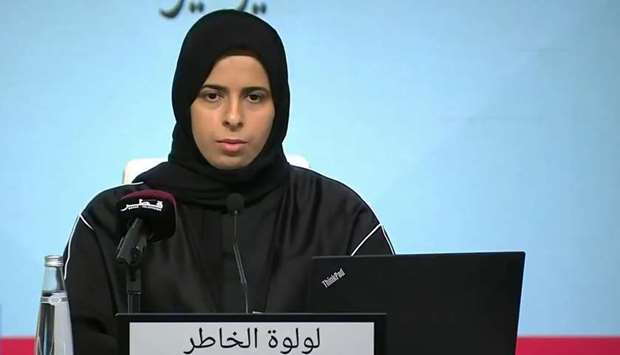The gradual lifting of Covid-19 restrictions does not in any way mean the lack of application or negligence in following the precautionary measures, and the transition from one stage to the next is largely dependent on strict indications and the extent of everyone's commitment to them.
This was highlighted by HE the Spokesperson of the Supreme Committee for Crisis Management, Lolwah bint Rashid AlKhater, during a press conference held on Monday to shed light on the latest developments and measures related to confronting Covid- 19 and the most prominent developments in this regard.
During the press conference, HE AlKhater announced the gradual lifting of the restrictions imposed in Qatar as a result of the Covid-19 outbreak, noting that the pandemic has swept the whole world and affected everyone, as reported by the official Qatar News Agency (QNA).
She stressed that in the event of non-compliance or if one of the indicators is negatively affected, there could be a re-imposition of some restrictions or a delay in the start of the following stages.
She said the various activities of life cannot be stopped indefinitely, adding that the time has come to gradually lift the restrictions through four stages while taking all the necessary precautions.
Giving a detailed presentation, she reviewed the graphic indicators showing a decline in the spread of Covid-19, noting that this decline would not have been possible without the procedures followed by the State and the commitment to instructions by members of the society.
HE AlKhater also reviewed the numbers and statistics that the country would have experienced had it not taken the precautionary measures.
She said the success in controlling the pandemic is due to the commitment of the majority of society members to the instructions imposed by the State to confront Covid-19, along with the precautionary measures that helped flatten the curve for a long period of time. This contributed to the success achieved in facing the pandemic and helped avoid putting pressure on the health system, QNA reported.
Noting the low mortality numbers in Qatar, she said this confirms the strength and efficiency of the health system, noting at the same time that the gradual lifting of restrictions is necessary and that precautionary measures and their continuation are necessary and must continue to be followed.
HE AlKhater reviewed the comprehensive master plan and detailed plans to start easing restrictions, explaining that the implementation of the plan is not only entrusted to the Ministry of Public Health or the government and private sectors, but rather to all members of the society - young and old, men and women.
She discussed the main pillars of the strategy to reduce restrictions, which are five pillars based on three dimensions - health, economic and social. The gradual lifting of restrictions is based on achieving a balance between health risks and social and economic benefits, and close monitoring of the impact of lifting restrictions through checks and tracking contacts effectively.
It is also based on implementing clear operational rules and plans to keep infection risks at the lowest levels, such as social distancing, political will and the willingness to apply restrictions if necessary, along with arrangements made by the Supreme Committee to achieve a clear response between government agencies, with clear decision-making processes based on data and indicators, QNA said.
She reviewed the experiences of the State in the gradual removal of restrictions, not posing a risk to public health and highlighting the need to benefit from studies and comparisons made on the experiences of other countries.
She said based on these studies, nine indicators were identified based on three axes, which are related to epidemiology, the capabilities of the healthcare system and public health.
The nine indicators are: continued low levels and continued decline in confirmed cases, estimation of the proliferative number of infections for less than one, occupancy rate in intensive care, adequate absorptive capacity for all emergency patients, adequate stock of personal protective equipment, low rate of infection among health practitioners, ability to perform daily laboratory tests, continuous monitoring and evaluation of contacts, capacity of quarantine facilities and quarantine.
HE AlKhater said a new discharge protocol was adopted, through which it was noted that the number of active cases began to decrease, which is a good indicator.
She also dealt with the proliferative number index, indicating that it means the ability of each affected person to transmit infection to other people, and indicated that a lower number means that the epidemic has receded.
She explained that these nine indicators will be followed during the gradual lifting of restrictions, hoping that all efforts will go in the right direction.
HE AlKhater also touched on the basic rules and general precautionary measures, which revolve around social distancing, the use of personal protection and hygiene equipment, early examination, use of the Ehteraz application and precautions to be followed with vulnerable groups.
She indicated that the first stage begins next Monday, June 15, while the second stage will begin on July 1, the third stage on August 1 and the fourth and final stage on September 1.
Her Excellency noted that the transition from one stage to another is based on indicators, facts and data, with the possibility of delaying the transition from one stage to another in case things did not go in the right way.

